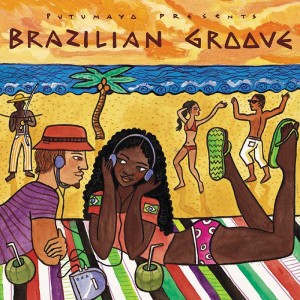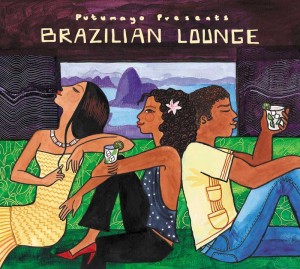Brazil Invades the World (Music Market)
A few years ago, Putumayo started a vein of Latin music albums that presented a compilation of Hispanic musicians playing modern, “chill” music. The first was titled “Latin Groove”, the second “Latin Lounge”. They were very listenable and great exposure for a bevy of new artists. Putumayo then decided to open the Brazil porthole, with stunning results. In part because the recording company had become versed in their new themes; they became slicker, more adept at their next venture into these realms. But “Brazilian Groove” and “Brazilian Lounge” both also had something else going for them. The musical and conceptual styles seemed to be made for each other. The world noticed, as reflected by sales. Putumayo noticed, too, intrigued by this global response. They released an “Acoustic Brazil” disc that was roundly received.
 Meanwhile, Putumayo had embarked upon a “Café” series, producing music from France, Spain, Greece and Italy under this new umbrella title. Of course, the obvious follow-up was “Brazilian Café”. This collection of twelve songs is as diverse as the other Putumayo Brazilian CDs; I think that with few exceptions the female vocalists best portray the sensuous side of Brazilian music. The Teresa Cristina offering, “Para Nao Contrariar Voce”, with her three piece band Grupo Semente, is a good example. Originally a manicurist and cosmetic salesperson, Teresa broke onto the Rio club scene at the age of twenty-six and never looked back. The song selected is one from the legendary samba singer/composer Paulinho Da Viola, a great choice, as the torch is passed to the next generation of Brazilian torch singers. Another great cut on this disc is the live track of “Feliz e Triste” by Ceumar, whose father was a well-known Brazilian singer, too. Ceumar’s pristine voice shines through on this acoustic bossa nova number.
Meanwhile, Putumayo had embarked upon a “Café” series, producing music from France, Spain, Greece and Italy under this new umbrella title. Of course, the obvious follow-up was “Brazilian Café”. This collection of twelve songs is as diverse as the other Putumayo Brazilian CDs; I think that with few exceptions the female vocalists best portray the sensuous side of Brazilian music. The Teresa Cristina offering, “Para Nao Contrariar Voce”, with her three piece band Grupo Semente, is a good example. Originally a manicurist and cosmetic salesperson, Teresa broke onto the Rio club scene at the age of twenty-six and never looked back. The song selected is one from the legendary samba singer/composer Paulinho Da Viola, a great choice, as the torch is passed to the next generation of Brazilian torch singers. Another great cut on this disc is the live track of “Feliz e Triste” by Ceumar, whose father was a well-known Brazilian singer, too. Ceumar’s pristine voice shines through on this acoustic bossa nova number.
 Rosa Passo’s contribution “Pequena Musica Nocturna” is another standout. Passos is also from a musical family and has performed with Yo Yo Ma, Ron Carter and Piquet D’Rivera, to name a few artists. In addition, Marcia Salomon contributes her rendition of “Quando o Carnaval Chegar”, by famed singer composer Chico Baurque, with her own stamp of style on the song. My personal favorite project on the disc is “Arranco de Varsovia” by the Brazilian samba band Forca da Imaginacao, formed by pianist Arranco de Varsovia. The band specializes in updating classic samba songs while putting their own spin on them at the same time. It’s a statement about the all-encompassing modernization and face lifts currently going on throughout Brazil, in lieu of hosting the upcoming World Cup there.
Rosa Passo’s contribution “Pequena Musica Nocturna” is another standout. Passos is also from a musical family and has performed with Yo Yo Ma, Ron Carter and Piquet D’Rivera, to name a few artists. In addition, Marcia Salomon contributes her rendition of “Quando o Carnaval Chegar”, by famed singer composer Chico Baurque, with her own stamp of style on the song. My personal favorite project on the disc is “Arranco de Varsovia” by the Brazilian samba band Forca da Imaginacao, formed by pianist Arranco de Varsovia. The band specializes in updating classic samba songs while putting their own spin on them at the same time. It’s a statement about the all-encompassing modernization and face lifts currently going on throughout Brazil, in lieu of hosting the upcoming World Cup there.
Don’t get me wrong: the male vocalist’s contributions are very listenable, too. Carlinhos Cor Das Aguas has a career spanning four decades. “Tempo Interno” is a pensive, introspective song that Carlinos penned himself. And Alexandre Leao offers the romantic “Vumbora Amor”. Collectively, these songs have helped catapult Brazil into the international music scene.


